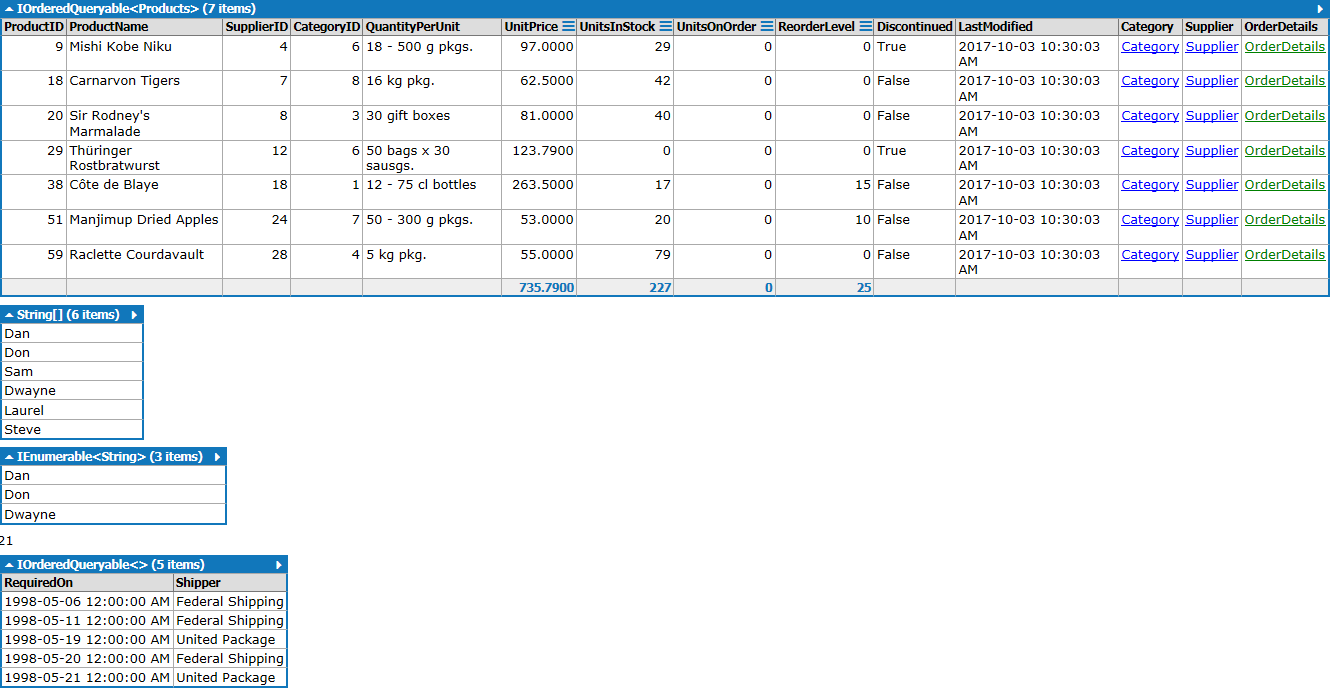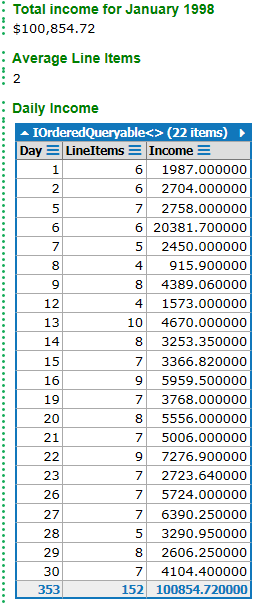# C# Statements
When using the statement context in LinqPad, you write complete lines of code as though you were writing in the body of a method. To output results in LinqPad, you need to use the .Dump() extension method on the objects you want to output.
# A Series of Examples
This example of C# Statements in LinqPad include both LINQ Queries on database tables and simple arrays.
/* Example 1: Querying data from Northwind */
var result = from row in Products
where row.UnitPrice > 50
select row;
// The following line won't work in your VS project....
result.Dump(); // the .Dump() method is an extension method in LinqPad - it's not in .NET
/* Example 2: Query a simple array of strings */
string[] names = { "Dan", "Don", "Sam", "Dwayne", "Laurel", "Steve" };
names.Dump();
var shortList = from person in names
where person.StartsWith("D")
select person;
shortList.Dump();
/* Example 3: Find the Orders that are due to be shipped */
var toShip = from due in Orders
where !due.ShippedDate.HasValue
orderby due.RequiredDate
select new // declaring an "anonymous type" on-the-fly
{ // using an initializer list to set the properties
RequiredOn = due.RequiredDate,
Shipper = due.ShipViaShipper.CompanyName
};
toShip.Count().Dump(); // show the count of items
toShip.Take(5).Dump(); // show the first 5 items

# Income and Business Volume Summary
LinqPad allows you to set a title for your output by sending a string into the .Dump() method.
The following query shows the total income for the previous month and the number of patrons served.
// Get the following from the Orders table for a specific month:
// OrderDate, ID, count of distinct items, total sale
// for items that have been shipped
// Then display the total income for the month and the average line items.
DateTime searchPeriod = new DateTime(1998,1,1);
var billsThisMonth = from item in Orders
where item.ShippedDate.HasValue
&& item.OrderDate.Value.Month == searchPeriod.Month
&& item.OrderDate.Value.Year == searchPeriod.Year
orderby item.OrderDate descending
select new
{
OrderDate = item.OrderDate,
OrderId = item.OrderID,
DistinctItems = item.OrderDetails.Count,
TotalSale = item.OrderDetails.Sum(od => od.Quantity * od.UnitPrice)
};
var title = string.Format("Total income for {0} {1}", searchPeriod.ToString("MMMM"), searchPeriod.Year);
// billsThisMonth.Dump();
billsThisMonth.Sum(tm => tm.TotalSale).ToString("C").Dump(title, true);
billsThisMonth.Average(tm => tm.DistinctItems).Dump("Average Line Items", true);
# Daily Income Report
With LinqPad, you can incrementally build your queries in multiple statements.
// Get the following from the Orders table for a specific month:
// OrderDate, ID, count of distinct items, total sale
// for items that have been shipped
// Then display the total income for the month and the average line items.
DateTime searchPeriod = new DateTime(1998,1,1);
var billsThisMonth = from item in Orders
where item.ShippedDate.HasValue
&& item.OrderDate.Value.Month == searchPeriod.Month
&& item.OrderDate.Value.Year == searchPeriod.Year
orderby item.OrderDate descending
select new
{
OrderDate = item.OrderDate,
OrderId = item.OrderID,
DistinctItems = item.OrderDetails.Count,
TotalSale = item.OrderDetails.Sum(od => od.Quantity * od.UnitPrice)
};
var title = string.Format("Total income for {0} {1}", searchPeriod.ToString("MMMM"), searchPeriod.Year);
// billsThisMonth.Dump();
billsThisMonth.Sum(tm => tm.TotalSale).ToString("C").Dump(title, true);
billsThisMonth.Average(tm => tm.DistinctItems).Dump("Average Line Items", true);
var report = from item in billsThisMonth
group item by item.OrderDate.Value.Day into dailySummary
select new
{
Day = dailySummary.Key,
LineItems = dailySummary.Sum(s => s.DistinctItems),
Income = dailySummary.Sum(s => s.TotalSale)
};
report.OrderBy(r => r.Day).Dump("Daily Income");
